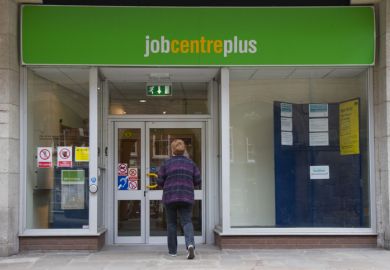Source: Alamy
Flying high: one academic argued that part of the purpose of university degrees is to allow a ‘reduction in complexity’ for employers in the recruitment process
A bright, personable young humanities graduate, fresh out of a top ranking university, lands a fiercely competitive job at a major international company. Why? Is it because three rigorous years at university has given her razor-sharp powers of analysis that are invaluable in the labour market? Or is her degree merely a signal that she possessed admirable qualities to begin with (such as hard work, organisation, intelligence and creativity) or traits that mean her face will fit in the new workplace (a privileged background, good connections and a certain worldview)? In other words, has university actually made her more economically productive or has higher education simply been an expensive exercise in displaying talents that have remained essentially unchanged since age 18?
This is the crux of an argument in educational economics between human capital theory, which contends that education’s financial benefits are down to real improvements in a person’s productivity, and signalling theory, which counters that qualifications may just be a way of telling potential employers what kind of person you are.
It has huge implications for universities, because, put simply, the more that governments believe in human capital theory, the more productivity they think will be gained from funding higher education.
The debate is particularly pertinent because in December last year, chancellor George Osborne announced that from 2015-16 there will be no cap on the number of undergraduates at English universities because “access to higher education is a basic tenet of economic success in the global race”. But an obscure report commissioned by the Department for Business, Innovation and Skills, and released earlier this year, concludes that when it comes to the debate about signalling, the government’s methodology is wrong, leading it to systematically overestimate the economic benefits of higher education.
In Methodological Issues in Estimating the Value Added of Further Education, Higher Education and Skills: A Review of Relevant Literature, a team of researchers from the University of Warwick and the consultancy Cambridge Econometrics tested BIS’ methodological assumptions about the economic returns of higher and further education.
The report first sets out the department’s approach on seven methodological issues. Regarding the signalling effects of higher education, BIS assumes that “higher earnings reflect higher productivity as a result of learning (ie, there is effectively no signalling effect)”.
This is an “extraordinary” assumption, according to Alison Wolf, Sir Roy Griffiths professor of public sector management at King’s College London. “I had no idea they didn’t take [signalling] into account at all,” she said, adding that failing to account for it was “bad policy and bad economics”.
Jürgen Enders, professor of higher education at the University of Southampton, was more circumspect, but said there were still “questions” over why the government had assumed that there was no signalling effect. “We all know that degrees have, among other things, a signalling function,” he said.
BIS’ own report recognises the effect its failure to include signalling will have. In the department’s calculations, “the potential signalling effects are not accounted for which may result in overstatement of the productivity returns to different forms of learning”, it says, and recommends that governments acknowledge signalling in the future.
One approach the government could take is to assume in future calculations that 10-30 per cent of the extra wages that come with higher levels of education are due to signalling. But any precise figure would be “arbitrary”, it cautions.
Known unknown
This points to one major problem in the debate: it is incredibly difficult to know just how much of a graduate’s extra earnings are down to the signalling effect of their degree.
“Higher education qualifies people in ways that make them more productive in the workplace and that contributes to gross domestic product,” said Professor Enders. “But we find it difficult to empirically nail down and estimate what the skill contribution actually is.”
This is because economists try to measure the productivity benefits of a degree by looking at how much more graduates earn when working, he explained. The problem with this, he pointed out, is that wages do not only reflect capabilities. For example, in some societies, women might generally earn less than men at the same rank despite having the same qualifications, indicating that factors other than educational achievement and productivity are at play.
Professor Wolf also declined to try to put an exact figure on the importance of signalling, and pointed out that it is likely to vary with time and a student’s subject. “We honestly have no idea but everything is pointing to it being significant,” she said.
But is it bad if a degree is partly a signal? Should that stop the government investing in higher education? The BIS report itself notes that qualifications may “enable a better match of individuals to jobs and thus more efficient use of skills/resources which is beneficial in itself”.
Part of the point of degrees is to allow a “reduction in complexity” for hiring employees, Professor Enders argued. “Imagine if you trained all these people in the way we do for getting a degree, but they would actually not get a degree. What would happen? How would employers respond? How would they sort out their candidates when the short-cut of a degree is taken away?”
He also stressed that governments should not forget the non-economic benefits of higher education. The question of how much higher education to fund is also about “how much education do you want in society”, he said.
The debate between human capital and signalling theory is a political as well as economic argument, according to David Palfreyman, director of the Oxford Centre for Higher Education Policy Studies. What he calls the higher education “lobby”, through Universities UK, “naturally argues the human capital theory line as a way of getting extra public money and/or justifying the charging of high tuition fees to the punters”.
Politicians also “hope” human capital theory “might be true as they flounder around trying to find something they can do to hopefully achieve economic growth”, he said.
Asked if BIS would take signalling into account in future given the report’s findings, a spokeswoman said the study “acknowledges the potential role of signalling in driving the observed earnings returns to degrees” but also “highlights that there is no consensus from the literature about their magnitude”.
“The authors therefore recommend that we should not reduce the estimated earnings returns to reflect signalling – as any reduction we applied would be arbitrary,” she added. “We will however continue to consider the implications of signalling effects in policy development and also in the development of any research in this area.”
Register to continue
Why register?
- Registration is free and only takes a moment
- Once registered, you can read 3 articles a month
- Sign up for our newsletter
Subscribe
Or subscribe for unlimited access to:
- Unlimited access to news, views, insights & reviews
- Digital editions
- Digital access to THE’s university and college rankings analysis
Already registered or a current subscriber? Login





